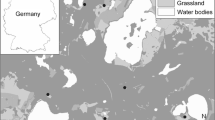Abstract.
Fonofos is a highly toxic insecticide to birds that, when used as a cereal seed treatment, has caused mortality of free-living feral pigeons (Columba livia). Pigeons kept individually under ad libitum feeding conditions in the laboratory do not suffer lethal poisoning because they develop a strong avoidance response to fonofos-treated seed, which restricts consumption to below lethal levels. Two laboratory experiments were conducted to assess the role of avoidance in reducing the risk of acute poisoning of captive birds under food stress. In the first experiment, pigeons acclimatized to feed on untreated wheat seeds for 6 h/day were presented with fonofos-treated seeds for 6 h on a testing day, following normal food surplus in one experimental group (eight birds) and 6 days of deprivation in another (eight birds). In the second experiment, different pigeons were acclimatized to a feeding regime of 2 h/day and treated seeds were offered without previous restriction (eight birds) or after 6 days of food restriction in which birds were given 15% of normal intake (eight birds). In the second experiment, six birds in each experimental group were videotaped to study their feeding behavior. Survivors at the end of the testing day were killed, and all birds were dissected and analyzed to determine carcass and pectoral muscle composition. Food-stressed birds lost ∼11% of their initial body weight during 6 days of total or partial food restriction, but they still had visible fat deposits and a high body fat content, indicating that they were in good body condition in terms of energy reserves. Consumption of treated seeds on the testing day was reduced in comparison with normal intake of untreated seed in all birds, but there were differences between experimental groups. In ad libitum–fed birds, consumption of treated seed in each experiment averaged 12% and 19% of normal levels, exposure to fonofos was below lethal levels, and no bird died. In food-stressed birds, consumption was higher (34% or 56% of normal levels for the first and second experiments, respectively) and led to the ingestion of seed containing lethal doses of pesticide. Two birds in the first experiment and three in the second died of acute poisoning within around 2 h of initial exposure. The avoidance response developed quickly in both ad libitum–fed and food-stressed birds. Feeding took place in most birds almost exclusively in the first 9 min of the testing day. Within this interval, birds of the two experimental groups stopped ingesting treated seeds around 6 min after the onset of feeding. The differences between experimental groups in consumption of treated seed were due to the higher feeding rate and effective feeding time in food-stressed birds. It is concluded that although feral pigeons under severe food stress develop an early and strong conditioned food aversion to fonofos-treated seeds, avoidance does not always prevent mortality. The need for including hunger stress as a factor in avian dietary toxicity tests to make testing conditions more representative of those experienced by wild birds is discussed.
Similar content being viewed by others
Author information
Authors and Affiliations
Additional information
Received: 17 July 1998/Accepted: 9 February 1999
Rights and permissions
About this article
Cite this article
Pascual, J., Fryday, S. & Hart, A. Effects of Food Restriction on Food Avoidance and Risk of Acute Poisoning of Captive Feral Pigeons from Fonofos-Treated Seeds. Arch. Environ. Contam. Toxicol. 37, 115–124 (1999). https://doi.org/10.1007/s002449900496
Issue Date:
DOI: https://doi.org/10.1007/s002449900496




